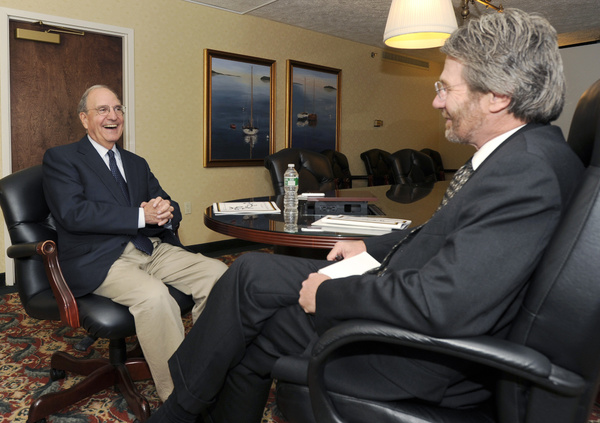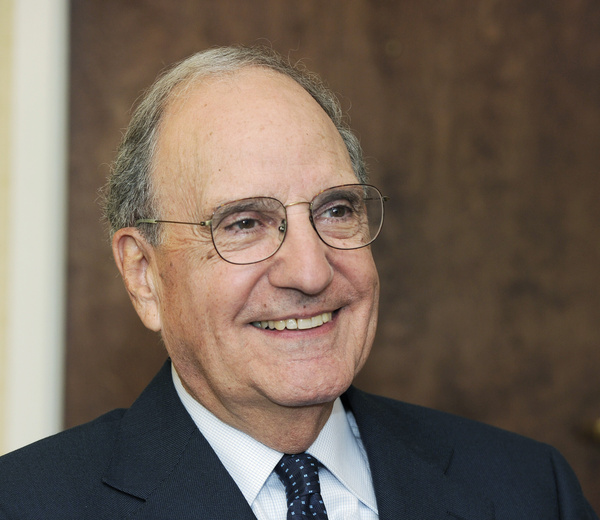It was November 1988. Maine’s own George Mitchell had just been elected Democratic majority leader of the U.S. Senate. And high atop his to-do list was a sit-down with then-Republican minority leader Sen. Robert Dole.
“I said to him, ‘This job is hard enough under the best of circumstances. It’s impossible under bad circumstances,’ ” Mitchell recalled last week.
And so Mitchell and Dole agreed on a few ground rules:
Never surprise each other.
Never try to embarrass each other.
And finally, be as fair as possible to each other under whatever circumstances might arise.
“We kept our word for six years,” Mitchell said. “Bob Dole and I never had a harsh word pass between us – in public or in private.”
Ah, the good old days.
Mitchell, now President Obama’s special envoy for Middle East peace, came home to Maine last week to speak to college students at the University of Maine and Colby College.
Then, on Friday evening, he presided over the 2010 Mitchell Institute Fall Gala – a glitzy affair that each year honors an ever-growing cadre of Maine high school students propelled into college by scholarships from the institute that bears Mitchell’s name.
He also took a few moments to talk politics.
First in Northern Ireland, where he helped forge the 1998 Good Friday Agreement, and now in the Middle East, where he’s laboring hard to bridge the chasm between Israelis and Palestinians, Mitchell has spent a good chunk of his later years persuading people embroiled in conflict to, first and foremost, sit down and talk with one another.
In other words, he’s proven against often formidable odds that it can be done over there.
But what about here?
As the United States lurches toward a pivotal midterm election, does Mitchell share the widely held perception that the political climate across this country has never been more polarized, more counterproductive, more downright nasty than it is right now?
Yes and no.
“First, I think you have to keep everything in historical perspective,” Mitchell said. “Whenever there has been severe economic distress in this country, there has been political unrest.”
It happened, he noted, back when Franklin D. Roosevelt rose to power in 1932. It happened during economic downturns in the 1870s and again in the 1890s. Now, as the economy sputters and the tea party movement sweeps across the political landscape, it’s happening once again.
“It isn’t new to have anger, to have new political institutions take shape, to have parties of protest,” Mitchell said.
But two things are new – and in Mitchell’s view, both are problematic.
“One is the rapidly increasing and vast amount of money that’s invested in political campaigns – now more than ever,” he said. “Much, much more than ever.”
As campaign coffers swell to all-time record levels, in part due to the U.S. Supreme Court’s recent lifting of the ban on corporate contributions, Mitchell sees voters’ trust in their elected officials evaporating “because they think (politicians) are beholden to their contributors, not to the citizens.”
Back when he was in the Senate arguing for this or that campaign finance reform measure, he said, “I used to say we are in danger of the bond of trust being severed – that is to say I thought of it as not having occurred at the time. I think now any objective observer has to say the bond has been severed.”
And how, pray tell, might it be repaired?
“Boy, that’s tougher than the Middle East,” Mitchell replied with a smile.
The other 21st century challenge to democracy as we’ve known it, Mitchell said, is the “immense power of modern electronic communications.” And along with it, the fragmentation of what we once called “mass media” into an infinite menu of news outlets that cater not to broad audiences, but rather to narrow, like-minded constituencies.
The result: Fox News tailors its message to the right, while MSNBC skews left. And alas, Mitchell said, neither audience emerges with “a fully balanced picture of the news.”
“It’s very reassuring for someone to turn on the television and hear what they already believe to be the case,” Mitchell noted. “That’s just human nature.”
So are we indeed going to hell in a handbasket? Is this, as many on the fringes warn, the beginning of the end for the greatest civilization the world has ever known?
Mitchell, ever the optimist, thinks not.
Sooner or later, he said, Americans will hit the reset button in the face of “a spectacular event that causes people to pause and look at the assumptions by which they have lived and acted.”
A case in point: As a U.S. senator, Mitchell labored unsuccessfully for years to persuade President Ronald Reagan and a Republican-controlled Senate to establish a national oil-spill protection program similar to the one Maine already had on its books.
“The chairman of the committee wouldn’t even permit a hearing to be held (on his bill),” Mitchell recalled. “Not only could I not get to first base – I couldn’t get out of the batter’s box.”
Then on March 24, 1989, the Exxon Valdez ran aground in Alaska’s Prince William Sound. Suddenly, Mitchell’s oil-spill legislation sailed through Congress and the White House and, just like that, became law.
“I have to tell you, it had nothing to do with me or my ability to persuade others because I tried for nine years and I couldn’t persuade anybody,” Mitchell said. “This was a dramatic change that occurred because of an external event, unplanned and unexpected, that simply changed the way people thought.”
Such seminal moments – the Watergate scandal, the Sept. 11 attacks, to name two others – do indeed galvanize our common interests, Mitchell said. And while it may feel this time like the republic indeed is headed over a cliff, history would suggest otherwise.
Often when he speaks publicly, Mitchell reads a quote to his audience and asks if anyone can identify its author.
It goes roughly like this: “Gone is faith. Gone is moderation … and grace has deserted our land.
Among men, solemn oaths are no longer respected. And no one reveres the immortal God. … Hatred, treachery and poverty prevail.”
Most people assume it came from Pat Robertson or Jerry Falwell or some other modern-day religious powerhouse. And most jaws drop when Mitchell tells them the actual source.
“It came from a guy named Theognis, a Greek poet, back in around 500 B.C.,” said Mitchell, who found the passage in “A History of Greece to 322 B.C.” by British scholar N.G.L. Hammond. “This is all part of a cycle of history that’s been repeated hundreds if not thousands of times around the world.”
Let’s hope so. It’s hard to feel confident about the future, after all, when Christine O’Donnell, the tea party-backed candidate for a U.S. Senate seat in Delaware, starts a now-viral political ad with the assertion, “I am not a witch.”
Mitchell laughed.
“Don’t forget,” he said, “Nixon said ‘I am not a crook.’ And he was president.”
Columnist Bill Nemitz can be contacted at 791-6323 or at: bnemitz@mainetoday.com
Send questions/comments to the editors.




Success. Please wait for the page to reload. If the page does not reload within 5 seconds, please refresh the page.
Enter your email and password to access comments.
Hi, to comment on stories you must . This profile is in addition to your subscription and website login.
Already have a commenting profile? .
Invalid username/password.
Please check your email to confirm and complete your registration.
Only subscribers are eligible to post comments. Please subscribe or login first for digital access. Here’s why.
Use the form below to reset your password. When you've submitted your account email, we will send an email with a reset code.